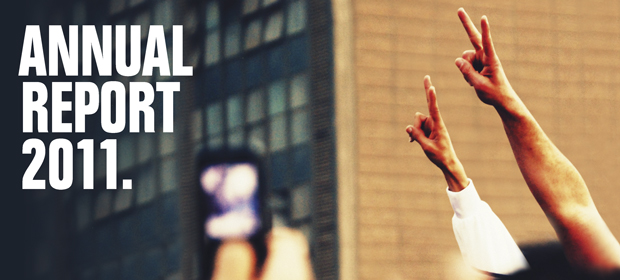
Corruption. Inevitable? Unstoppable? We don’t think so – and we want to hear your ideas for new ways of talking about it.
Launched today, our 2011 Annual Report offers a snapshot of our activities around the world in 2011 – from the 3,500 election monitors we recruited in Guatemala through social media, to the 17 year old in Indonesia who’s started an annual teachers’ award to cut down on absent staff, to the videos that are putting a stop to water-borne diseases in Giima, Sierra Leone. When you see these and other stories side by side, corruption seems anything but inevitable, and certainly not unstoppable.
As our integrity pacts show, businesses don’t have to dodge regulations to be competitive. In Malaysia, more than 60 companies have signed up to a pact – which involve all participants committing publicly to zero corruption, and an external auditor watching over a business deal or public procurement contract to check they keep to their word. One Malaysian company has found itself inundated with new international customers who heard about its reputation for honesty and transparency.
And people don’t need to be silent in the face of injustice. Offering free legal advice to victims and witnesses of corruption, our anti-corruption legal advice centres are now working in more than 50 countries around the world. So far, 120,000 people have come forward. 10 new centres are planned for 2012.
As mobile phone usage and internet access spreads, other opportunities are opening up for people to demand change and monitor progress. Take Fix My Street in Tbilisi, Georgia, for example, an online portal where users can flag problems such as potholes or missed garbage collections, triggering a message to the relevant authorities. To make sure the authorities react to the issue, other users track changes and repairs by posting comments and photos. 750 problems have been fixed already, and the mayor’s office now features a prominent link to the portal on their website.
With initiatives ranging from travelling theatre groups to radio shows to community notice boards, more and more people are learning about the services they’re entitled to, and how they can hold their leaders to account if they’re not delivered. Like in Lebanon, where young people have been elected to “shadow councils” with the skills to monitor actual municipal budgets and provide recommendations on improving accountability, and a budget to carry out development projects of their own.
As you’ll see from the images below, there are many other examples we could give. In the report, there are even more. One thing is clear – change has begun, and it’s time for new messages. We’ve come up with a series of statements about what corruption means to us: how it affects the daily lives of people around the world, and how people are standing up and demanding change.
Here are just a few, you’ll find lots more in the report: Corruption picks on the weakest. Corruption thinks justice can be bought. Corruption believes in rights not privileges. Corruption doesn’t think about tomorrow. Corruption is afraid of the truth. Corruption has no future.
These were our thoughts, but there’s a lot more to say, and we’d love to hear your ideas. What does corruption mean to you?















 Connect with us on Facebook
Connect with us on Facebook Follow us on Twitter
Follow us on Twitter